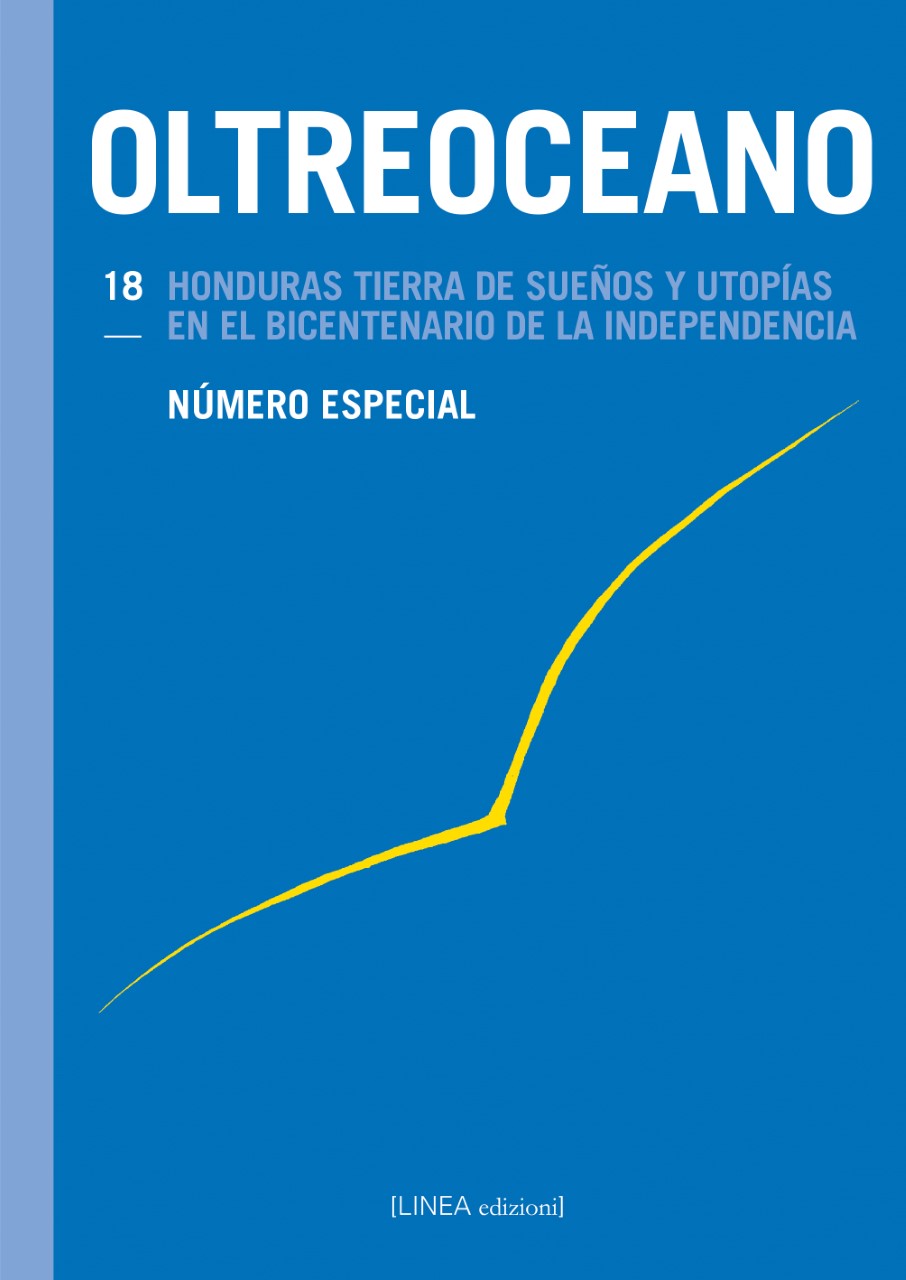Vanguardia y posvanguardia en Honduras. Imagen múltiple, negrismo, motivos futuristas y vocación social
DOI:
https://doi.org/10.53154/Oltreoceano18Keywords:
vanguardia/posvanguardia, poesía hondureña, Jacobo Cárcamo, Generaciones del ’35 y del ’50Abstract
A través del estudio de Brasas azules (1938) se intenta demostrar que Jacobo Cárcamo practica numerosas facetas de la vanguardia continental. Fraternidad antifascista, poesía impura, motivos futuristas, negrismo e imagen múltiple con versificación breve lo convierten en un autor insoslayable para entender la transición del tardomodernismo a la posvanguardia hondureña.
Avant-garde and post-avant-garde in Honduras. Multiple image, negrismo, futuristic motifs and social vocation
Through the study of Brasas azules (1938) it is intended to show that Jacobo Cárcamo shares numerous proposals of the continental avant-garde. Antifascist fraternity, impure poetry, futurist motives, negrismo and multiple image make him an unavoidable author to understand the transition from late modernism to the post-avant-garde in Honduras.
Downloads
References
Barrera, T. (2006): Las vanguardias hispanoamericanas. Madrid: Síntesis.
Bonilla, J. & Bonet, J. M. (2019): Tierra negra con alas. Antología de la poesía vanguardista latinoamericana.
Sevilla: Fundación José Manuel Lara.
Cárcamo, J. V. (1938): Brasas azules. Tegucigalpa: Calderón.
Cárcamo, J. V. (1938): Canto a José Miaja. En J. V. Cárcamo, Brasas azules (pp. 23-26). Tegucigalpa: Calderón.
Cárcamo, J. V. (1938): Antífona del puño. En J. V. Cárcamo, Brasas azules (pp. 29-30). Tegucigalpa: Calderón.
Cárcamo, J. V. (1938): Poema último a la mujer primera. En J. V. Cárcamo, Brasas azules (p. 44). Tegucigalpa: Calderón.
Cárcamo, J. V. (1938): Canción negroide. En J. V. Cárcamo, Brasas azules (pp. 33-35). Tegucigalpa: Calderón.
Cárcamo, J. V. (1938): Hai-Kais. En J. V. Cárcamo, Brasas azules (p. 14). Tegucigalpa: Calderón.
Debicki, A. P. (1981): Estudios sobre poesía española contemporánea. La generación de 1924-1925. Madrid: Gredos.
Ferreiro, A. M. (2015): El hombre que se comió un autobús. Sevilla: Renacimiento.
Grünfeld, M. G. (1995): Antología de la poesía latinoamericana de vanguardia (1916-1935). Madrid: Hiperión.
Guillén, N (1980): Cantos para soldados y sones para turistas. México: Premia.
López Velarde, R. (1919): Zozobra. México: México Moderno.
Martínez Pérsico, M. (2012): Recepción ambivalente del Futurismo en Argentina. Lingue e linguaggi, 8, pp. 89-98.
Martínez Pérsico, M. (2014): España no está sola. Del localismo a la fraternidad hispánica en las letras del Ecuador (1914-1939). En C. de Mora & A. García Morales (Eds.), Viajeros, diplomáticos y exiliados. Escritores hispanoamericanos en España (1914-1939), III (pp. 253-280). Wien: Peter Lang.
Martínez Pérsico, M. (2016): Formas del insilio en la literatura ecuatoriana del siglo XX. Quito: Universidad Andina Simón Bolívar / Corporación Editora Nacional.
Martínez Pérsico, M. (2019): Imago verba. Retórica ultraísta y autoficción en Cansinos Assens. Viterbo: Sette Città.
Palés Matos, L. (1994): Tuntún de pasa y grifería. Madrid: Anaya.
Downloads
Published
How to Cite
Issue
Section
License

This work is licensed under a Creative Commons Attribution-NonCommercial-ShareAlike 4.0 International License.
The authors undertake to comply with the following conditions, which are considered accepted at the time of submission of their contributions.
The sending of a text implies that it is unpublished and not submitted to be published elsewhere.
1. If accepted, the author shall confer on the publisher the right to publish and distribute it both in paper form and in the online electronic edition. The published articles will be downloadable and made available in open access.
2. Provided that it correctly indicates that the first publication took place in the journal Oltreoceano. Rivista sulle migrazioni the author has the right to: a) reproduce the article in separate extracts or collected in a volume; b) publish the article on their personal website or teaching site provided that these sites are of a non-commercial nature; c) deposit the article in online archives of a non-commercial nature, linked to the institution they belong to or as part of projects for the non-commercial dissemination and open access of scientific works.
The use of contributions by third parties, for commercial or otherwise unauthorized purposes, is not allowed. The publisher declines all responsibility for the unauthorized use of the material published in the journal.












